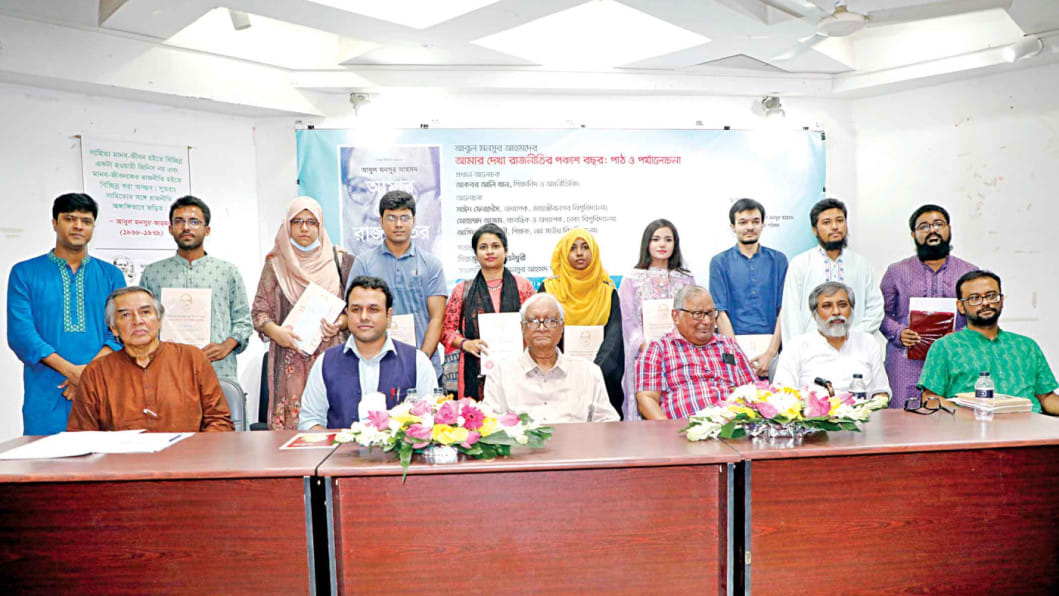An unwavering champion of democracy

"Free democracy. Only then will society heal itself," said economist and educationist Akbar Ali Khan, as he read from Abul Mansur Ahmad's political memoir "Amar Dekha Rajneetir Ponchash Bochhor", at an event held at Dhaka University's Faculty of Social Sciences yesterday.
In commemoration of the 124th birth anniversary of politician, writer and journalist Abul Mansur Ahmad, his literary and political works -- his political memoir in particular -- were discussed at the event.
Akbar Ali Khan presented the keynote, followed by the speeches of Sayeed Ferdous, partition historian and professor of anthropology at Jahangirnagar University; Mohammad Azam, professor of Bangla at Dhaka University; and Asif Bin Ali, lecturer at North South University.
Literary critic, intellectual, and political analyst Prof Serajul Islam Choudhury presided over the event.
With independence being the central theme of the political memoir, all four speeches highlighted the author's focus on democracy as the fundamental pillar of Bangladesh's constitution.
"Democracy can be 'protected' and established today through proportional representation, elections that allow change and social harmony, strengthening of regional governments, and referenda that allow the population to vote without imposing new laws or altering the constitution," said Akbar Ali Khan.
"If we want democracy, we need more research, trial and error, and implementation," he added.
"Amar Dekha Rajneetir Ponchash Bochhor" is the "most widely referenced book" on Bangladeshi history and politics in global academia, said Mohammad Azam.
Both Azam and Asif Bin Ali highlighted the relevance of Abul Mansur Ahmad's work in contemporary discourse. His political memoir, along with the rest of his writings, addresses issues of Bangalee identity, Bangalee Muslim identity, and politics as it affected the ordinary citizen.
Abul Mansur Ahmad's approach is unique because he prioritised simple language, clarity of thought, and critical thinking. The role of culture was most central to these ideas, said speakers.
As a social historian focusing on East Bengal during partition, Sayeed Ferdous pointed out that Abul Mansur Ahmad's writings take one back to a time that has been left behind.
"If we don't understand his time and the hope, frustration, and dilemma faced by Bangalee Muslims at the time, we will misinterpret his works," said Ferdous.
Professor Emeritus Serajul Islam Choudhury said, "Abul Mansur Ahmad sought to record and analyse the society and politics of his time. He tried to communicate it to as many people as possible, in a language that would be understood by the masses."
"But there was great pain and frustration behind the humour of Abul Mansur Ahmad's words," Professor Choudhury said.
"Without knowledge, awareness, and revolution of thought, social development is impossible. Abul Mansur Ahmad showed this to us."
The event, organised by Abul Mansur Ahmad Smriti Parishad, ended with a vote of thanks by Abul Mansur Ahmad's youngest son, Mahfuz Anam, editor and publisher of The Daily Star.
At the end of the discussion, a prize giving ceremony took place for the Abul Mansur Ahmad Essay Contest, organised recently by the parishad for the fifth time, where the top nine winners were presented with awards.
The topics for this year's essay competition were "Abul Mansur Ahmad's thoughts on Bengali Culture", "Journalist Abul Mansur Ahmad versus today's journalism", and "Abul Mansur Ahmad's role in expanding industry-commerce".
In the first category, Mohammad Abu Sayeed, Nafis Raihan, and Rizvi Ahmed Badhon won the first, second and third prize, respectively.
In the second category, the top three winners were Kaniz Fatema Kanika, Mohammad Golam Mostafa, and Jahanara Begum Mukta.
Mir Muntasir Hossain, Pratiti Piya, and Sumaiya Khanam won the top prizes in the third category.

 For all latest news, follow The Daily Star's Google News channel.
For all latest news, follow The Daily Star's Google News channel. 




Comments